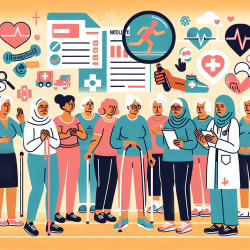Introduction: The Importance of Transgender Health Education
In today's diverse society, providing inclusive and comprehensive healthcare is more important than ever. Transgender individuals, who represent a significant portion of the population, often face unique health challenges and disparities. According to the Williams Institute, approximately 1.4 million adults in the United States identify as transgender. Unfortunately, many of these individuals experience barriers to accessing quality healthcare, which can lead to adverse health outcomes.
Recent research, such as the study titled "Curricular Approaches to Transgender Health in Physician Assistant Education," highlights the need for improved education in this area. This blog will explore how practitioners can enhance their skills by implementing the findings from this research and encourage further exploration into transgender health education.
Key Findings from the Research
The study conducted a comprehensive survey of transgender health curricula in U.S. Physician Assistant (PA) programs. Here are some of the key findings:
- 85.6% of PA programs include at least one hour of transgender health content in their curricula.
- The most common topics covered include differentiating between sex and gender, health disparities, and barriers to care.
- Programs with knowledgeable faculty members are more likely to deliver comprehensive transgender health education.
- Geographic region and perceived importance of the topic significantly influence the inclusion of transgender health content in curricula.
Steps to Enhance Transgender Health Education
Based on the research findings, here are actionable steps that practitioners and educational institutions can take to improve transgender health education:
- Integrate Transgender Health Topics: Incorporate transgender health topics into existing courses such as medical interviewing, women's health, and endocrinology.
- Utilize Expert Faculty: Ensure that faculty members are knowledgeable about transgender health to effectively teach and emphasize its importance.
- Address Barriers: Overcome barriers such as lack of time and faculty knowledge by using modular curricula and integrating topics into existing courses.
- Focus on Vulnerable Populations: Pay special attention to transgender youth, who are at a higher risk for mental health issues and suicide.
Encouraging Further Research and Implementation
While this study provides valuable insights, it also highlights the need for further research and development of transgender health curricula. Practitioners and educators are encouraged to:
- Conduct additional studies to explore the effectiveness of different educational approaches.
- Develop time-efficient and comprehensive curricula that can be easily integrated into existing programs.
- Share best practices and resources with peers to enhance transgender health education across different regions.
Conclusion
Improving transgender health education is crucial for ensuring that healthcare providers can deliver compassionate and competent care to this vulnerable population. By implementing the findings from the research and encouraging further exploration, practitioners can make a significant impact on the health and well-being of transgender individuals.
To read the original research paper, please follow this link: Curricular Approaches to Transgender Health in Physician Assistant Education.










